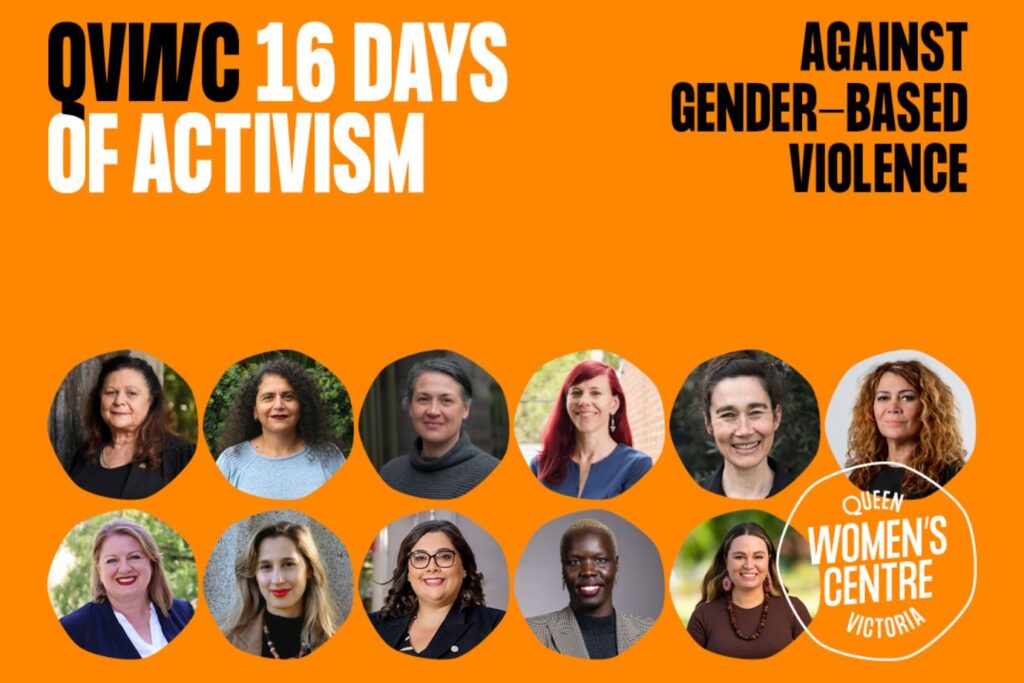The United Nations (UN) Women’s annual campaign addressing gender-based violence began on Saturday November 25, the International Day to End Violence against Women.
Over 16 days, governments, institutions and people around the world are asked to raise awareness of this global epidemic and spread the message that no person should be a victim of abuse based on their gender.
This year, UN Women’s theme of the 16 Days of Activism against Gender Based Violence is: “UNITE! Invest to prevent violence against women and girls.”
The Queen Victoria Women’s Centre in Melbourne, Victoria, chatted with eleven women in Australia who are leading the way in prevention, management and support of cases of violence against women.
Here’s what they had to say.
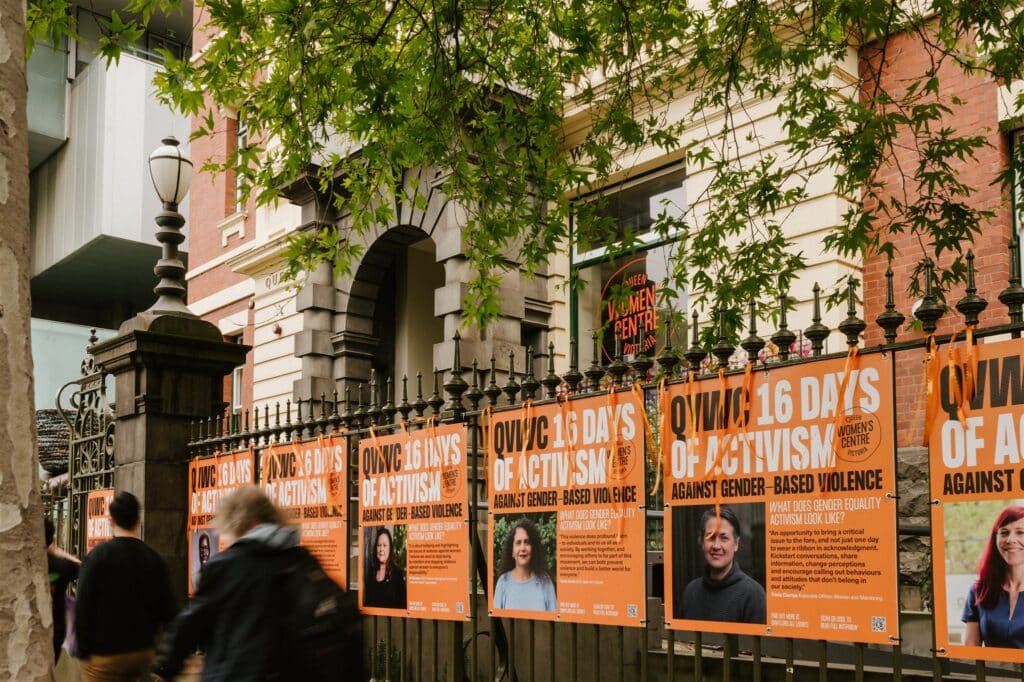
Antoinette Braybrook, CEO DJIRRA

What does 16 Days of Activism mean to you?
For Aboriginal women, 16 Days of Activism provides a unique opportunity to amplify our voices and draw attention to the devastating impact that gendered violence has on our lives and our children’s lives.
Year after year, day after day, Djirra advocates, agitates and innovates, because Aboriginal women’s lives matter to us.
What’s the one thing that you would change now so we can live in a violence free Victoria?
Rather than investing in punitive approaches, Governments must ensure firstly that Aboriginal women’s voices inform legislation and policies and secondly that our self-determined solutions are prioritised. This is not negotiable.
We continue to call for structural and systemic change. We call for the systems that target and overlook Aboriginal women, and compromise our safety, to be dismantled. We will not be silent and these structures and systems will not silence us.
A longstanding, 21 year vision of Djirra’s is to establish Victoria’s first Aboriginal Women’s Centre. Government investment is essential to realising this vision and to truly demonstrate its commitment to Aboriginal women and children’s lives.
What role does your organisation play in reducing gender-based violence?
Djirra’s services and programs have touched the lives of thousands and thousands of Aboriginal women over 21 years.
We work hard to debunk the myth that the violence that our women experience is an ‘Aboriginal problem’. We see our women, we believe our women, we hear our women, and our individual and collective self-determination must be invested in.
Natalie Hutchins, Minister for Women, Victorian Government
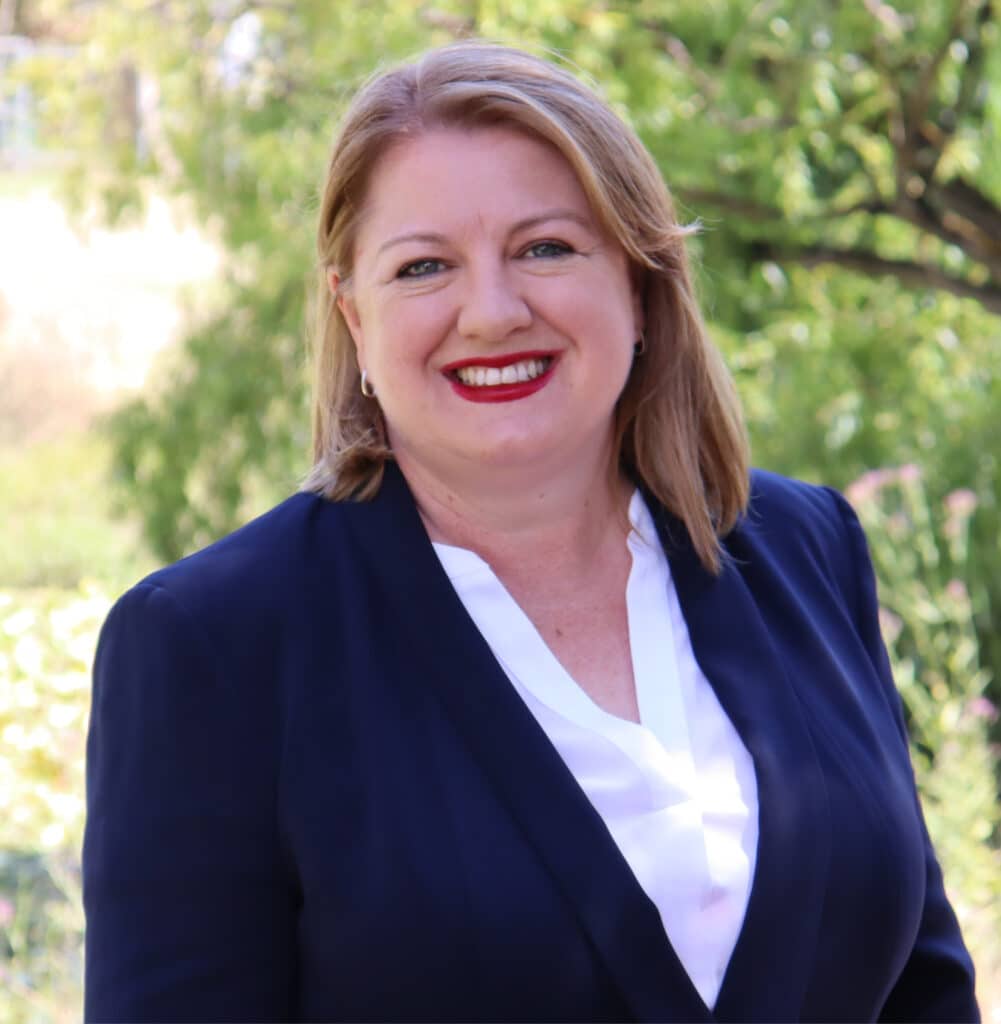
What does 16 Days of Activism mean to you?
It means that we continue to put family violence and respect for women front and centre of the public agenda. We need to continue the conversation as we still gave much to do to achieve a violence-free Victoria.
What’s one thing that could change now so we can live in a violence free Victoria?
We would achieve significant behavioural change if we could embed respect for women and in girls in young people to prevent family violence.
You have recently launched Victoria’s Gender Equality Strategy, Our Equal State. How will this help us work towards living in a gendered violence free Victoria?
We have 110 across portfolio Actions that will deliver better outcomes for women and girls. Gender inequality is a driver of family violence in women and through Our Equal State we are committed to achieving gender equality to create sustained and generational change. We need to ensure that the girls of today are empowered to be the women of tomorrow regardless of the colour of their skin, religious beliefs, or cultural upbringing.
Dr Jill Gallagher AO, CEO VACCHO

What does 16 Days of Activism mean to you?
16 days of activism is about lobbing and highlighting the issues of violence against women. I personally believe that this subject matter is often not talked about in the open and some people think this does not affect them, but I believe we need to stop being by-standers and stopping violence against women is everyone’s responsibility.
What’s the one thing that you would change now so we can live in a violence free Victoria?
We need to have indicators for Community Wellbeing that governments can measure. Also I believe we need to do more with children around respectful relationships
What role does your organisation play in reducing gender-based violence?
VACCHO has rainbow tick accreditation, but we do not do a lot of work in the space of Violence against women. We would like to but lack of recourses, but we do attend the Dhelk Dja Partnership Forum.
Tania Farha, CEO Safe and Equal

What does 16 Days of Activism mean to you?
16 Days of Activism provides an opportunity for us all to be part of a global movement for change to end violence against women, and all forms of family and gender-based violence.
This violence does profound harm – to individuals and to us all as a society. To have communities across Victoria join together in this way highlights the significant role we all have in preventing and responding to family and gender-based violence.
By working together, and encouraging others to be part of this movement, we can both prevent violence and build a better world for everyone.
What’s the one thing that could change now so we can live in a violence free Victoria?
The one thing we must do is change the attitudes, beliefs and behaviours that lead to violence, to stop it from happening in the first place. But that won’t happen overnight, so we have to continue our multiple efforts to work towards ending family and gender-based violence in Victoria.
In the 8 years since the Royal Commission into Family Violence, there has been a monumental shift in the way we respond to family violence in Victoria – and in the way we’re working to stop this violence before it starts.
If we want to live in a violence-free Victoria, we need to ensure the momentum from the last 8 years continues. We need continued investment from all levels of government across the continuum, from primary prevention to early intervention, crisis response, and recovery. We also need ongoing commitment from all parts of the community to address this violence. It will take time, but it’s critical we keep moving forward and do not stall on the progress we have made.
What role does your organisation play in reducing gender-based violence?
As the peak body for specialist family violence services that provide support to victim survivors in Victoria, Safe and Equal leads, advocates for and acts on behalf of our members – with a focus across the continuum from prevention to response and recovery.
We work closely and collaboratively to challenge and eliminate family and gender-based violence, by developing family violence practice and supporting workforces; strengthening and connecting organisations, sectors and systems; and building momentum for social change.
All the work we engage in recognises the gendered nature of violence in our society, and works towards achieving the long-term attitudinal, cultural, systemic and behaviour change required to address family and gender-based violence in Victoria.
Has there been any noticeable change since we spoke last year?
There have been several significant legislative changes in the last 12 months, including the introduction of affirmative consent laws in Victoria; and the introduction of 10 days paid domestic and family violence leave for all Australian employees.
Changes like this show how much Australians recognise the impact family violence has on the community, and that everybody plays a role in being part of the solution.
We have also seen significant changes at the national level with the release of the First Action Plan to End Violence against Women and Children, accompanied by some budget to support the work of the action plan, and the announcement of the standalone National Plan to End Violence against First Nations Women and Children.
We cannot make the changes we need to see without every level of government, including local government, working together.
Sissy Eileen Austin
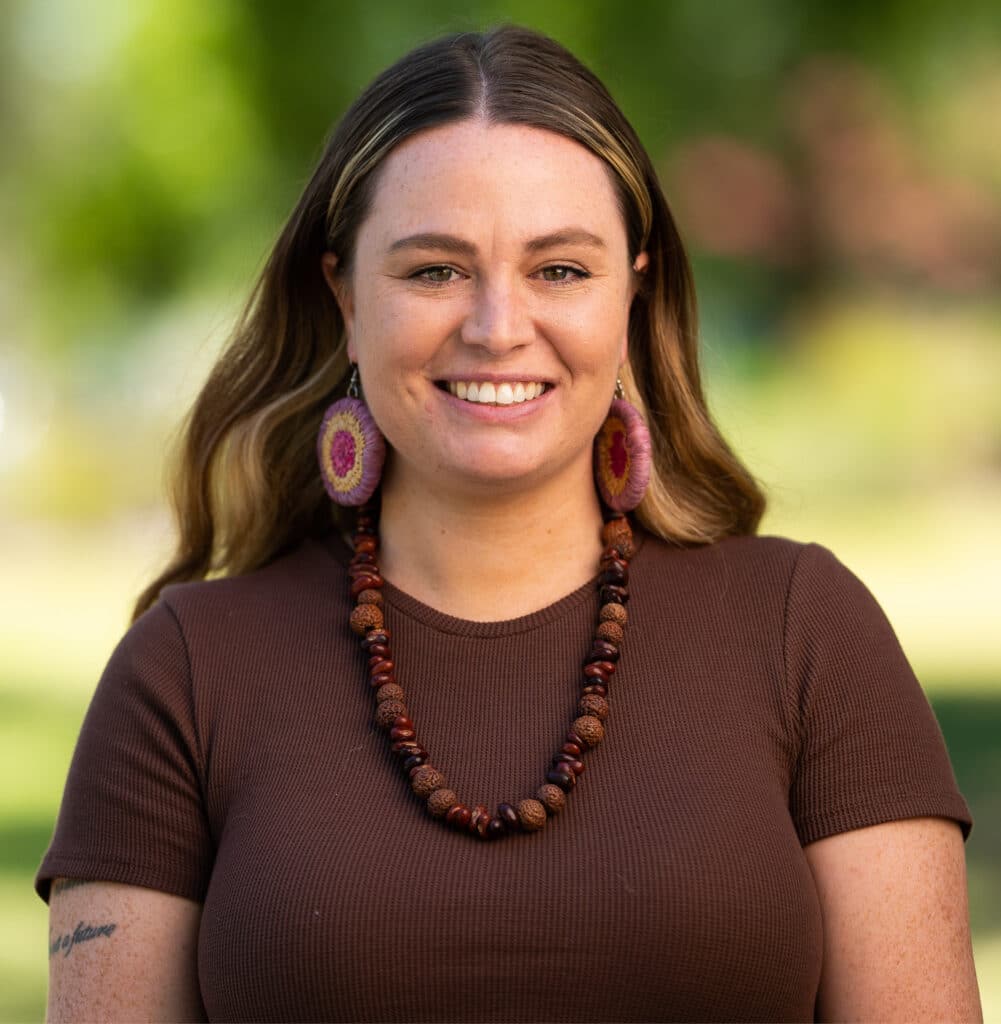
What does 16 Days of Activism mean to you?
16 Days of Activism to me means to spread the message that victim/survivors of violence are not alone and that we can heal from violence in an empowering way. It is also an opportunity to envision a circuit breaker and a moment to pause and reflect on how deeply rooted violence is in our country and a need for truth telling and a treaty.
What is the one thing that you would change now so we can live in a violence free Victoria?
One thing I would change is the violence towards Aboriginal women, this includes violent systems such as the child policing system, the policing and prison industry and the continued violent racism from society towards Aboriginal women. Aboriginal women are key to the thriving of this country and a country that treats Aboriginal women like the queens that we are is a country that all those living here would benefit from.
What role does your organisation play in reducing gender-based violence?
The role I play is advocating for and practicing healing my own traumas, in doing this I am actively ensuring that I am reducing the continuation/load of intergenerational trauma. I tell my story, but my story doesn’t end at the traumatic, violent incident itself, the chapters following are empowering and a beautiful realisation of how strong women are.
Sheena Watt MP, Victorian Legislative Council

What does 16 Days of Activism mean to you?
These 16 days are a time to reflect on the achievements we have made to end gender-based violence and to renew our commitment to act.
I am uplifted by the thousands of women and girls around the world using their voices, standing up and making a difference. I am proud to walk alongside them.
What is the one thing that you would change now so we can live in a violence free Victoria?
The drivers of gender-based violence are complex. The Allan Labor government is moving forward with strategies that challenge the attitudes, behaviours, cultures, and systems that drive gendered violence. I will continue to support those strategies so we can make real and lasting change.
What role does your organisation play in reducing gender-based violence?
I have the great privilege of representing the people of Victoria as a Member of the Allan Labor Government. We lead the nation in gender equality, and we will continue to deliver the Free from violence: Victoria’s strategy to prevent family violence and all forms of violence against women plan for all Victorian women.
Jenna Tuke, Manager CASA House

What does 16 Days of Activism mean to you?
The “16 Days of Activism Against Gender-Based Violence” hold profound importance for CASA House as the campaign aligns closely with our work, values and mission. The 16 Days provide an opportunity to affirm and promote our commitment to provide high quality, trauma-informed care to victim survivors of sexual assault, and to advocate for a world where sexual assault is eradicated and a society in which survivors are heard, believed, and supported.
The global campaign provides services with a platform to raise awareness about of gender-based violence, challenge the societal norms that enable and perpetuate sexual assault – and advocate for change!
What’s the one thing that could change now so we can live in a violence free Victoria?
Gender-based sexual violence doesn’t happen in a vacuum. It is upheld and perpetuated by drivers that are embedded in our culture and day to day lives. The bad news is that I can’t name one single change, one single solution …the good news is however, that we can all play a part.
Learn about the prevalence of gender-based violence and how common it is in Australia. Learn about the drivers and how these might show up in your day to day lives and then set to work to challenge and change these drivers of violence.
What role does your organisation play in reducing gender-based violence?
Activism has always played a vital role in the history and ongoing work of CASA House. CASAs have historically been at the forefront of advocating for the rights and well-being of survivors of sexual assault. Through activism, CASA has pushed for legislative reforms, improved support services for victim survivors , and raised greater public awareness of sexual violence. This has been achieved through the collective strength of victim survivors and their allies who have challenged the societal norms that perpetuate sexual assault and strongly promoted a culture of consent and respect.
Jenny Davidson, CEO Council of Single Mothers and their Children

What does 16 Days of Activism mean to you?
I believe that the 16 Days of Activism creates a valuable global platform to draw attention to the pervasive issue of family and domestic violence, and for various segments of the community to get involved in actions for change. A single action, day or location is not sufficient to change such an intractable issue. I am always delighted to participate.
What’s the one thing that could change now so we can live in a violence free Victoria?
To create a violence-free Victoria, I would require every member of our community to attend training on gender, respectful relationships and creating equity… probably annually; I don’t think once would achieve it.
What role does your organisation play in reducing gender-based violence?
Council of Single Mothers and their Children works to support women raising children alone, about 60% of whom have escaped family violence. We empower women to navigate the many systems that can offer support, or create challenges, as they work to build a bright future for themselves and their children. Our specialist services provide support for short-, medium- and long-term recovery from family violence, which can take many years.
Has there been any noticeable change since we spoke last year?
2023 has been a year of extraordinary and long-fought wins for single mothers! Parenting Payment Single is now available under the youngest child turns 14, up from 8 years old. The ParentsNext program, which has been very punitive and damaging to parents with children under six, has been made voluntary and will be replaced with a voluntary and genuinely beneficial program from July 2024. And long-overdue changes have been passed to the Family Law Act that will place children’s best interests at the centre of decision-making. All of these will make an immediate and long-term difference to the financial circumstances and wellbeing of single mothers and their children.
Tricia Ciampa, Executive Officer Women and Mentoring

What does 16 Days of Activism mean to you?
An opportunity to bring a critical issue to the fore, and not just one day to wear a ribbon in acknowledgment, but to have a series of actions and awareness-raising, to kickstart conversations, share information, change perceptions and encourage calling out behaviours and attitudes that don’t belong in our society.
What’s the one thing that you would change now so we can live in a violence free Victoria?
A more broad understanding of what consent means – how and when it should be actively sought out, and that it can be withdrawn at any time. Discussions about what consent looks and feels like should be the norm, and having the space to change your mind without retribution. I think that could make a real difference in creating more violence-free Victoria.
What role does your organisation play in reducing gender-based violence?
Women and Mentoring takes a gender-responsive approach to addressing women’s contact with the legal system. We build meaningful connections across communities, focusing on empowering women to make informed choices that can have a positive impact in their lives. Our mentors provide non-judgemental support, someone to problem solve with, and encouragement to assist women in building their individual capacity and achieve their goals.
Lina Orozco Múnera, Professional Migrant Women

What does 16 days of activism mean to you?
To me, the 16 days of activism against gender-based violence is about imagining a future where everybody lives their lives free of violence. Is about recognising that women and girls, as well as gender-diverse people, have the right to be treated as equal.
These 16 days of activism serve as a global platform to raise awareness that women’s rights are human rights, and that violence against women and girls is a fundamental violation of those human rights. It is a time to amplify and listen to the voices of victim survivors, promote discussions around gender equality, and push for policies that ensure the safety and empowerment of women and girls. Because violence against women is preventable. And we all deserve to be respected for who we are.
What is the one thing that you would change now so we can live in a violence free Victoria?
There are a lot of things that need changing so we can live in a world free of violence. But one thing that anyone can start doing today is challenging rigid gender stereotypes and roles.
Growing up, we often were told how to behave, what to like and how we should look based on our gender, rather than our identities. These assumptions limit us and put us all in certain boxes that predetermine our lives by choosing things such as caregiving roles, and household responsibilities, and they can even shape our professional journeys. Rigid gender stereotypes can scare us from showing who we really are and affect how we interact with others in our lives. They make it harder for us to choose what we want to do and can even cause unfair treatment and harm.
Challenging these preconceptions about gender is key to fostering a society where everyone has the freedom to express their true selves.
What role does your organization play in reducing Gender Based Violence?
Through Professional Migrant Women (PMW), we contribute to gender equality by empowering migrant women and encouraging them to achieve financial independence. At PMW, we provide essential support, mentorship, networking opportunities, and educational resources for migrant women, helping them secure their first professional job in Australia and advance in their careers.
All women deserve to be safe, equal, and respected. Unfortunately, their experiences of violence and access to services vary disproportionally. Migrants, refugees, and multicultural women often face intersecting forms of discrimination, intensifying the prevalence and dynamics of gender-based violence. At PMW, we actively advocate for and raise awareness about the unique challenges the women in our community encounter. By highlighting the intersecting forms of oppression and discrimination in our community, we aim to challenge and change the attitudes and behaviours contributing to gender-based violence and highlight how our experiences of violence are different.
Our focus on fostering a strong and supportive network among migrant women and allies creates an environment to raise awareness and educate about gender-based violence to the broader community. Within this network, our community finds connection, solidarity, and support, which play a vital role in preventing and addressing gender-based violence.
Learn more about us: professionalmigrantwomen.com.au
Nyadol Nyuon, Director of Victoria University’s Sir Zelman Cowen Centre
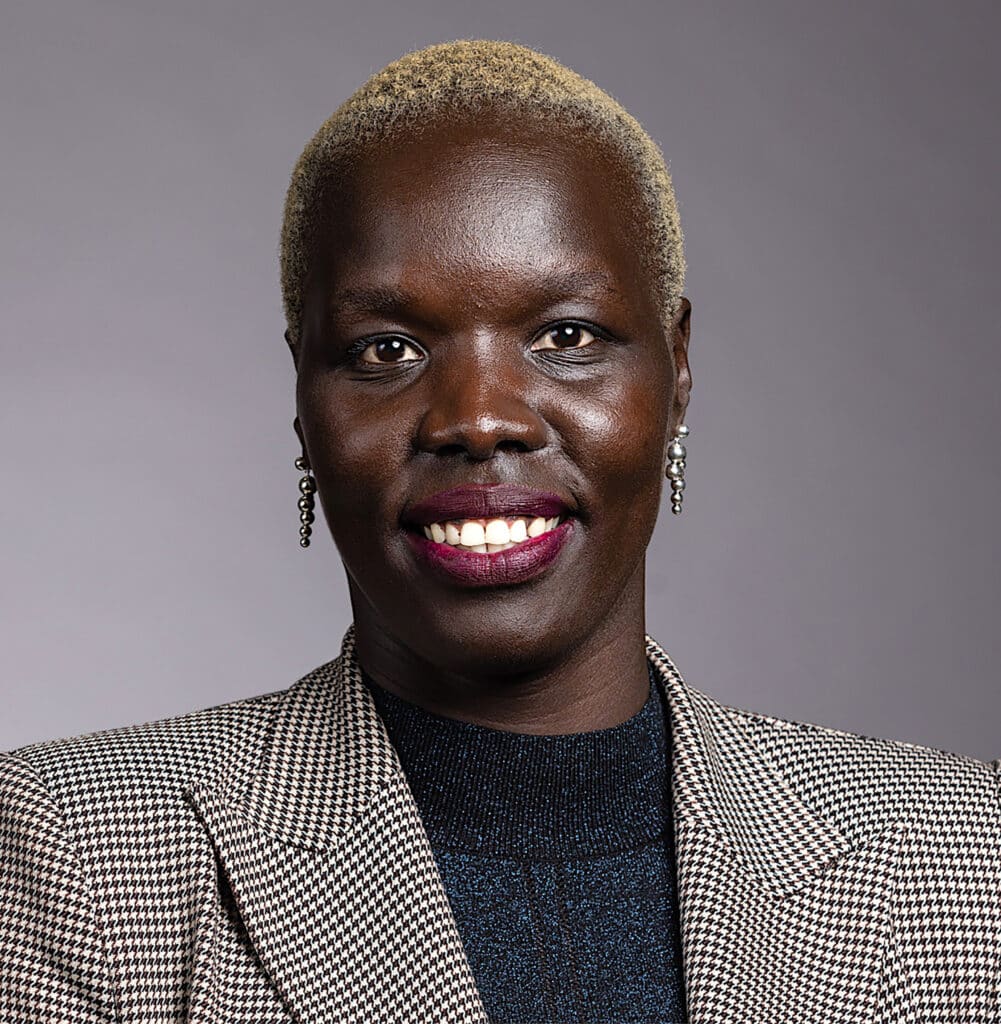
What does 16 days of activism mean to you?
A self-aware movement conscious that achieving true equality requires addressing the gender gap and the disparities among women themselves. This ensures every woman’s worth is protected with the same level of value as those who form the new power majority.
Queen Victoria Women’s Centre website: www.qvwc.org.au
Instagram: @qvwc_melbourne

